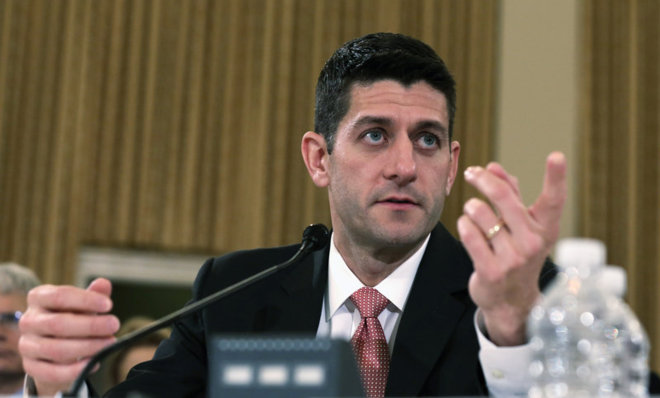The emerging budget deal is a small victory for Republicans
Civility might also make a small comeback in Washington, but Democrats have little else to cheer about


A free daily email with the biggest news stories of the day – and the best features from TheWeek.com
You are now subscribed
Your newsletter sign-up was successful
The good news for Congress is that if both houses pass a budget deal by Friday, they get to go home for Christmas break with no high-stakes fiscal grudge match awaiting them when they get back. And the prospects for passing a budget deal being hammered out by Sen. Patty Murray (D-Wash.) and Rep. Paul Ryan (R-Wis.), maybe even without the histrionics of recent years, seem to be pretty good.
The contours of the deal are emerging in news reports, but the details are being closely held by Murray and Ryan and their teams. The two legislators head up the 29-member House-Senate conference committee set up by the deal that ended October's government shutdown, but they are widely expected to bypass the committee and bring the package directly to the floor of their respective chambers for a vote.
The deal reportedly proposes to authorize about $1.015 trillion in discretionary funding, more than the $967 billion sought by Republicans — the amount specified in the budget-slicing sequestration that kicked in earlier this year — and less than the $1.058 trillion sought by Democrats. Spitting the difference — so far, so good.
The Week
Escape your echo chamber. Get the facts behind the news, plus analysis from multiple perspectives.

Sign up for The Week's Free Newsletters
From our morning news briefing to a weekly Good News Newsletter, get the best of The Week delivered directly to your inbox.
From our morning news briefing to a weekly Good News Newsletter, get the best of The Week delivered directly to your inbox.
But other than partially reversing the sequestration, Democrats don't appear to be getting much in the package. Last week, House Minority Leader Nancy Pelosi (D-Calif.) and other Democrats suggested they may not support a deal that doesn't extend benefits for the long-term unemployed; 1.3 million people will lose those benefits if Congress lets them lapse on December 28. On Sunday, Sen. Dick Durbin (Ill.), the No. 2 Senate Democrat, said that isn't something Democrats will scuttle a deal over, meaning it will probably be taken up in separate legislation where Democrats have less leverage.
Democrats will probably also have to swallow an increase in the amount that federal employees have to contribute to their pensions — a provision especially anathema to Maryland's powerful Democratic delegation. Because Democrats will almost certainly be needed to pass the bill through the House, the increase will be much smaller than the 5.5 percent hike being pushed by Republicans.
"At the Democratic caucus meetings this last week in the House, there was in some senior places some great agita about the process and about the reports of the substance coming out of that process like I haven't seen in a long time," Rep. Gerry Connolly (D-Va.) tells Politico.
What are the Republicans giving up? A little bit of deficit-reduction, primarily — though a hefty chunk of the increased spending will be used to ease $19 billion in Defense Department cuts scheduled to kick in come January. Most Republicans would like to avoid those cuts. Some Republicans will also oppose whatever mechanism Ryan and Murray come up with to offset the cost of partially repealing the sequestration — raising airline users fees is one safe bet.
A free daily email with the biggest news stories of the day – and the best features from TheWeek.com
But that's the main reason Republicans are the net winners in this modest budget deal: Austerity is the default, the sequester is still the law of the land, and any attempts to undo this earlier budget miscalculation — remember, sequestration was supposed to be a budgetary cudgel so brutal it would force Congress to make a long-term deal — have to be paid for. This is, at least in the Obama years, Republican turf. Democrats want the sequester repealed entirely.
Republicans also gain from what's not in the emerging deal: There's no raising of the debt ceiling and, equally important, it erases the risk of another government shutdown anytime soon. Congress is deeply, deeply unpopular, and Republicans are still more unpopular than Democrats, in large part because they're seen as obstructionist. A budget deal without any big Tea Party theatrics would be a welcome change for GOP leaders concerned with portraying the party as ready to govern.
"That this can be declared a victory is an indicator of how low the process has sunk," says Robert Bixby of the bipartisan, deficit-focused Concord Coalition. "They haven't really done anything except avoid another crisis." Urban Institute budget expert Gene Steuerle agrees: "With this little package, we're not going to climb out of the hole we've dug," he says. "All we're doing is agreeing to stop throwing shovels at each other."
Score one for the GOP.
Peter has worked as a news and culture writer and editor at The Week since the site's launch in 2008. He covers politics, world affairs, religion and cultural currents. His journalism career began as a copy editor at a financial newswire and has included editorial positions at The New York Times Magazine, Facts on File, and Oregon State University.
